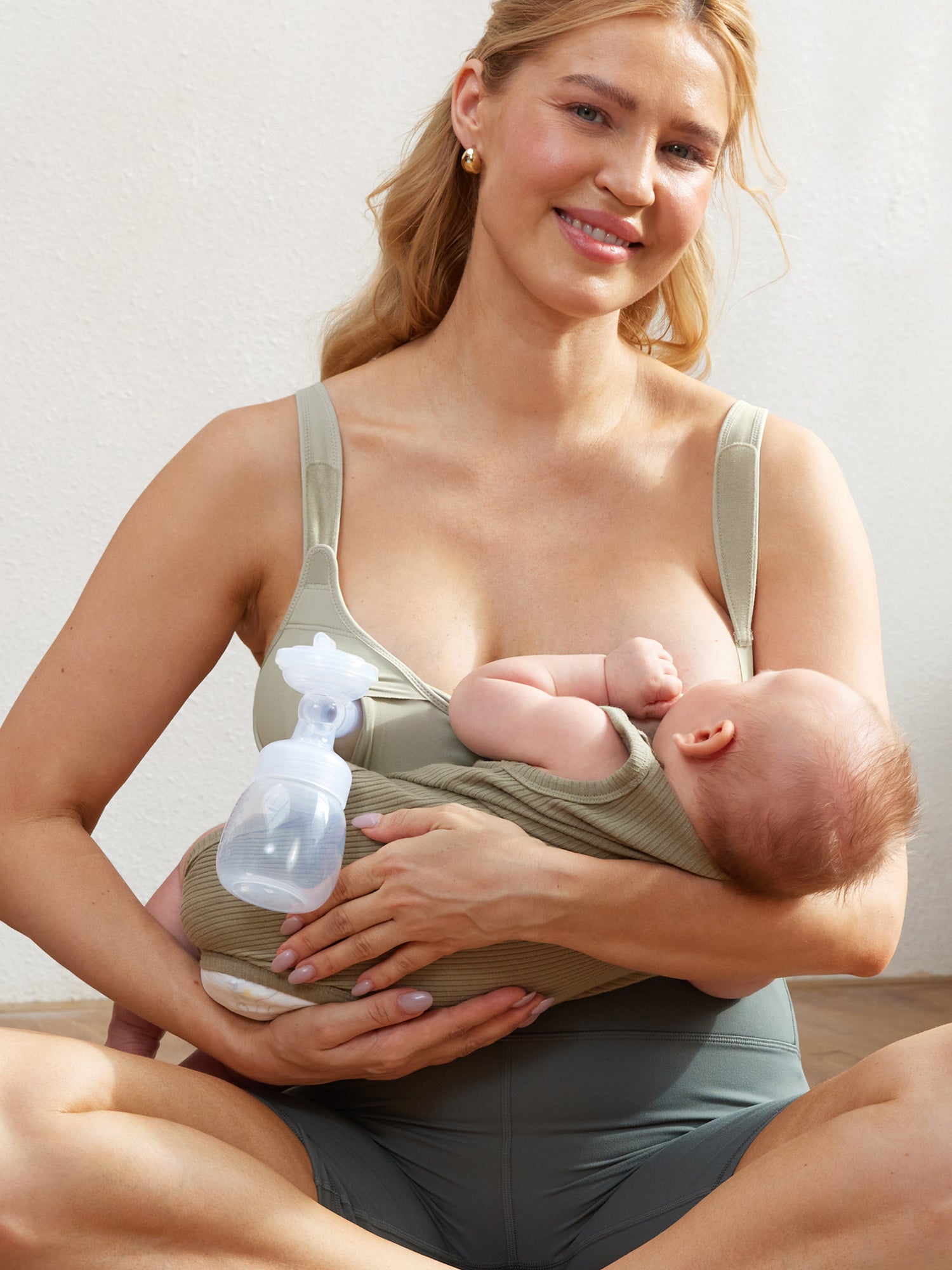Breastfeeding Anxiety: What to do about it

Anxiety is a normal emotion that informs us when something in our environment may be threatening, whether physically or emotionally, to us or the people we care about. When we feel anxious, we want to take action to make ourselves feel safe. Without anxiety, it is difficult to recognize danger or to do things that help keep us safe.
Sometimes, however, anxiety can creep up on us and make us misinterpret certain situations as threatening when they are not. This is often made worse by the information we get from others, our past experiences, and how confident we feel about coping with the situation. This explains why you can feel anxious about a situation you have been told would be difficult, or the feeling of anxiety you get in anticipation of a situation you had difficulty with in the past.
The reality of breastfeeding anxiety
Studies show that 1 in 10 people will experience an anxiety disorder at some point in their lives. This number increases significantly among pregnant women and new mothers.
If this is what you are going through, it does not mean that there is something wrong with you. You do not need medication, and you are not a failure or a bad mother. You are simply experiencing what a lot of mothers also go through, and it is perfectly normal. You simply need to learn how to manage it.
Parenthood brings with it a lot of often conflicting information and massive amounts of pressure to get everything right. Every woman wants to be seen as a “good” mother, even though they make up that definition for themselves, setting unrealistic expectations along the way. When you also consider the fact that you are sleep deprived and exhausted especially during those first few months, you can start to see why anxiety is so common in new mothers.
Furthermore, there is a lot of pressure put on expectant women and new mothers to breastfeed their babies. While this message is rooted in science, it has inadvertently contributed to many women developing breastfeeding anxiety that only becomes worse when things don’t go perfectly from day one. Sometimes, breastfeeding anxiety can become so bad that it can make you question whether or not you are a good parent.
Breastfeeding anxiety, if left unchecked, can affect your overall well-being as well, resulting in headaches, difficulty sleeping, trouble concentrating, and changes in your appetite. It can also contribute to the development of perinatal mood and anxiety disorder (PMAD) and postpartum depression (PPD). For example, if you have been planning to exclusively breastfeed throughout your pregnancy only to end up having no choice but to switch to formula, it can trigger extreme anxiety and even depression.
With this guide, we hope to provide you with information on what breastfeeding anxiety is and how to deal with it. Anxiety is indeed a complicated condition with individualized solutions. However, we hope that this guide will begin to normalize it and help you see what a normal reaction is and when you need to seek help.
Signs of Anxiety
When you are anxious about a situation, you excessively focus on thoughts and things that scare or upset you. This is often accompanied by several physical symptoms that will vary from person to person, including:
- Irritability
- Headaches
- Feeling sick
- Wobbly legs
- Feeling dizzy
- Disturbed sleep
- Racing heartbeat
- Feeling exhausted
- Changes in breathing
- Tightness of the chest
- Difficulty concentrating
- Butterflies in your stomach
- Tingling in the arms and legs
- Muscles tension in the neck, shoulders, or jaw
- Upset stomach or needing to use the toilet frequently or urgently
While you experience these symptoms, you may also worry excessively, feel like others are judging you, and have feelings of self-doubt thinking that you are not good in some way. Your mind focuses on negative emotions and you feel unable to stop thinking about the thing that’s making you anxious.
Sometimes, these thoughts can get out of control. They can make it difficult to live your normal daily life, leading you to:
- Reduce your normal activities
- Be unable to face talking to people
- Avoid crowded places
- Repeatedly check things just to be sure
- Avoid doing things that make you anxious
How breastfeeding anxiety often starts
As a parent, you want to do what’s best for your child. Naturally, some level of anxiety is expected, especially if you are a first-time parent.
There is a lot of advice out there about how best to care for your child, especially when it comes to feeding. With the introduction of multiple alternatives to breastfeeding such as formula feeding and exclusively pumping, breastfeeding has become less common than it used to be, and information about what is normal has become quite sparse as a result. This has left room for misinformation to creep in, which is often the primary cause of breastfeeding anxiety.
Some of the things that can make you anxious about breastfeeding your baby are advice about how much your baby should sleep, that she should be sleeping through the night by the time she is X weeks old, that you must breastfeed your baby every X hours even in the middle of the night, that if your baby is fussy she is probably hungry, that if you have a large baby you won’t have enough milk for her, and on and on and on. There is an endless stream of ideas and advice out there, most of which is rooted in old childbearing practices that are no longer evidence-based.
Another thing that might make you anxious about breastfeeding your baby is the fact that it is impossible to tell exactly how much milk your baby has had when you breastfeed. This can cause you to worry about whether or not your baby is getting enough milk. Well, worry not because as long as your baby is gaining weight, feeding regularly, and having 6-8 wet diapers a day, she is perfectly fine.
Breastfeeding anxiety is also often exacerbated by the fear of the prospect of sleepless nights while feeding the baby. Breastfed babies wake up more frequently at night. While this is not a bad thing for babies, it usually leads to disrupted sleep patterns for the parents. Breastfeeding when exhausted can make your anxiety worse because you are not thinking clearly when you are tired. Plus, while few babies do sleep through the night the first year, societal pressures make it seem like most babies do, leading to feelings of self-doubt.
What can you do to deal with breastfeeding anxiety
The good news is that there are several things that you can do to manage breastfeeding anxiety. Here are some of them:
- Deal with it if you can. The good news is that if you cannot do anything about it or if the thing you are anxious about has not happened yet, you can just let it go. Practicing mindfulness might be helpful for this.
- Talk to people. Talk to other moms in similar situations to find out the truth about what is normal. Online forums, Facebook groups, and baby groups are great for this. If the mood of a forum is negative, leave it and look for one with a positive vibe.
- Keep doing things that you enjoy. You may have to adapt a bit with your baby around, but that does not mean that you have to stop. Get a babysitter so you can enjoy some time by yourself.
- Get out of the house. Run errands, go for drives, and go for walks. Getting some fresh air helps a lot.
- Instead of spending all your time inside, go outside for a few minutes every once in a while. It will help you clear your head when negative thoughts start creeping in.
- Focus on positivity every day. Instead of only thinking about the problems, consider looking at the positive side of things first. Make a list of all the things you are doing well despite all your struggles.
- Ignore uncomfortable advice. When someone is stating their opinions instead of facts, just tune them out. Every baby is different. You do not have to conform to anyone else’s ideas of how your baby should act.
- Get off google. There is no point in driving yourself mad by googling every little thing. Stick to reliable sources and avoid falling into rabbit holes that will only make you doubt yourself even more.
Final Thoughts
Some level of anxiety is normal and even welcome in parenthood. However, sometimes, you may find yourself feeling anxious for most of the day. Your anxiety may even interfere with your normal quality of life. When this happens, it becomes a problem. If the tips outlined above are not helping you deal with the issue, you may have to seek professional help. Be sure to bring it up with your healthcare provider at your next appointment.
SUBCRIBE FOR NEWSLETTER
Shop today with 5% OFF your first order of all products storewide


















